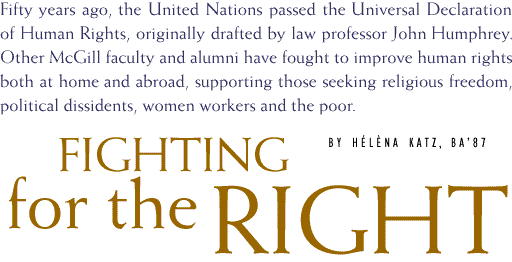
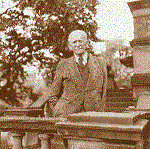 It started innocently enough in June 1988 with associate law librarian Louise Robertson looking through a library filing cabinet for John Humphrey's notes for a Roman Law course he had taught at McGill some 40 years earlier. It started innocently enough in June 1988 with associate law librarian Louise Robertson looking through a library filing cabinet for John Humphrey's notes for a Roman Law course he had taught at McGill some 40 years earlier.
Humphrey, BCom'25, BA'27, BCL'29, PhD'45, LLD'76, thought he had donated the notes to the library, along with documents from his tenure as the first director of the United Nations Division of Human Rights from 1946 to 1966. He had taught at McGill for ten years before taking up the UN post in New York, and returned to the University to resume teaching well into his 80s.
Robertson never did find the course notes, but acting law librarian John Hobbins's interest was piqued by the Humphrey files. Sifting through them in his office, he found himself looking at the first drafts of the Universal Declaration of Human Rights.
Library staff already knew about the first handwritten draft and the six subsequent typewritten revisions that had notes scrawled in the margins. They had even been placed in acid-free envelopes. But Hobbins was about to find out why this historically important material had received so little attention. While researching an article about how the declaration had changed from its first draft to the final version, he was surprised to learn that French human rights advocate and 1968 Nobel Peace Prize winner René Cassin was credited with writing the first draft of the UN Declaration.
"The scope of my article shifted from how the draft changed over two years to who wrote the first draft of the declaration," recalls Hobbins, now associate director of libraries. Humphrey's claims that he had written the first draft were apparently not even accepted within his own faculty.
Using original UN documents, Hobbins was eventually able to prove that Cassin's revision of the declaration was actually based on Humphrey's draft. "If you went back to the original sources, it was clear," Hobbins says, "but nobody ever bothered. They just assumed it was Cassin's work."
The idea for the universal declaration stemmed from Nazi Germany's monstrous abuses and abrogation of human rights during World War II. The task of drafting it was placed in the hands of the newly formed United Nations and Humphrey, director of its Division of Human Rights. Using existing constitutions and bills of rights from around the globe, he decided which elements needed to be included in a universal version. After a number of revisions, the General Assembly of the United Nations adopted the universal declaration on December 10, 1948.
In 1963, long after his role in drafting "the Magna Carta of all mankind," as colleague Eleanor Roosevelt referred to the declaration, Humphrey put forward the idea of having a United Nations High Commissioner for Human Rights, a position finally created in 1993.
After returning to teach at McGill in 1966, Humphrey became the first president of the national section of Amnesty International in Canada and was one of the founders of the Canadian Human Rights Foundation. In 1988, the McGill Faculty of Law established the "John Humphrey Lectureship on Human Rights" which Humphrey himself inaugurated, and in the same year he received the United Nations Award for Outstanding Achievement in the Field of Human Rights.
Even well into his 80s, Humphrey continued to defend victims of human rights abuses, lobbying the Japanese government on behalf of Korean women who had been used as sex slaves -- the so-called military comfort women -- by Japanese soldiers during World War II. He died on March 14, 1995, just shy of his 90th birthday.
Humphrey's role in shaping human rights has been commemorated in a number ways, including a Canadian postage stamp, a Heritage Minute television spot and a special exhibit this summer at the National Arts Centre in Ottawa.
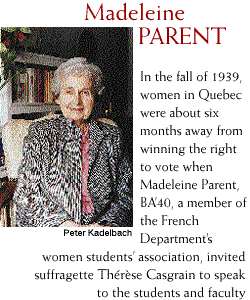 Parent was unapologetic about having displeased her male department head, nor did she have any regrets about the resulting boycott of the speech by many people. "I wanted to be free to do what I thought needed to be done on campus," she says. Parent was unapologetic about having displeased her male department head, nor did she have any regrets about the resulting boycott of the speech by many people. "I wanted to be free to do what I thought needed to be done on campus," she says.
It was a 1940s lecture on civil liberties that she attended and a meeting with Leah Roback, a union activist 15 years her senior, that made Parent realize that she had found her calling. By 1942, Parent had joined the small ranks of women union organizers (where she would stay until her retirement 41 years later). The following year, she became an organizer for the United Textile Workers of America with her husband Kent Rowley, and led the Dominion Textile strike of 1946 in Quebec, for which she and Rowley were convicted of seditious conspiracy by the anti-labour Duplessis government (the charges were ultimately overturned in 1954). Parent was fired by the UTWA in 1952 under false charges of being a communist, and subsequently started the Canadian Textile and Chemical Union, and later, in 1969, the Confederation of Canadian Unions.
The presence of women union organizers was a challenge to the men who tolerated pay inequity, recalls the elegantly dressed Parent as she sits in her Outremont apartment. Some men in her own union felt threatened, she says, by her fight for women's right to be paid the same wage as men performing the same jobs. But her days of fighting for student rights had prepared her well for the challenge. "I wasn't intimidated by that kind of thing because my training had been on campus," she says.
Parent had her work cut out for her. While workers had few rights, life for women was even more difficult as they coped with 50-hour weeks in the cotton mills and their responsibilities at home. "They had an inferior position at work and had to obey their husbands at home," she says. "That's how they would earn their place in heaven."
It was rewarding for Parent to see workers, especially women, gain the confidence to assemble and stand up for their rights. During the particularly difficult strike at Dominion Textile's Valleyfield cotton mill in 1946, the wives, mothers and daughters of the 3,300 workers joined the men on the picket line. When police used tear gas to try to disperse the crowd of 5,000 strikers and their families, the women fought back. "The volley of tear gas by the police was met with a volley of stones in response," Parent recalls. Meanwhile, she was camped out all day in front of the offices of the deputy minister of labour, waiting to speak with him. "I knew all the exits," she remembers with a smile.
The battles of the past are being replayed with the move towards globalization and the proposed Multilateral Agreement on Investment (MAI), observes Parent. As countries are handing over more and more powers to corporations, "governments are failing in their commitments to people in the areas of human rights and in the gains we'd made and thought we'd secured," she says.
But one lesson Parent says she learned long ago is that defeat isn't final. "So long as they lived and breathed, people could pick themselves up and fight again for their rights." It's something that opponents of the floundering MAI are realizing as they fight the signing of the global agreement.
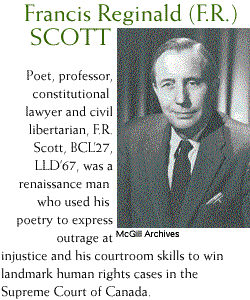 Born in Quebec City in 1899, Scott studied at Bishop's College in Lennoxville, and was a Rhodes scholar at Oxford before graduating from McGill's Faculty of Law in 1927. A contemporary of John Humphrey, Scott began teaching at McGill's Faculty of Law in 1928. Born in Quebec City in 1899, Scott studied at Bishop's College in Lennoxville, and was a Rhodes scholar at Oxford before graduating from McGill's Faculty of Law in 1927. A contemporary of John Humphrey, Scott began teaching at McGill's Faculty of Law in 1928.
Four years later, he co-founded the League for Social Reconstruction, a socialist organization whose formation was prompted by the miseries of the Great Depression and closely linked with the Cooperative Commonwealth Federation (CCF), forerunner to the NDP. In 1933, Scott helped draft the CCF's "radical" platform that called for a minimum wage, unemployment insurance, workers' compensation and government-run health insurance.
Indeed, Scott's caustic writings against the Canadian establishment and criticism of the practices of corporations led by men who were on the McGill Board of Governors proved to be a source of consternation for the McGill administration. Scott was senior enough to survive a purge in the early '40s by Chancellor Edward Beatty of radical faculty supporting the CCF, when concern for McGill's reputation as a hotbed of socialism was high and the leftist reputation viewed as a threat to important private donations. When Scott served as the CCF's national chairman from 1942 to 1950, he again won no friends in the McGill administration, who refused to appoint him Dean of Law until 1961, when his CCF activities had pretty much subsided after the Federation had been transformed into the New Democratic Party.
A civil libertarian, Scott used the courts to overturn the "Padlock Act," a law that authoritarian Quebec Premier Maurice Duplessis introduced in 1937, giving police the right to padlock buildings used by suspected communists as meeting places. The 1957 victory marked Scott's first Supreme Court triumph.
Scott's next major battle would again pit him against the autocratic premier. In 1946, Duplessis had ordered that the liquor licence of Montreal restaurateur Frank Roncarelli be revoked. Roncarelli had posted bail for some 300 Jehovah's Witnesses arrested for peddling literature and preaching without a licence and who were accused of sedition. Without the revenue that a liquor licence brought in, Roncarelli -- not a Jehovah's Witness himself -- had been forced out of business within a year.
When the matter came before the Supreme Court in 1959, Scott successfully defended Jehovah's Witnesses' right to religious freedom in Quebec. He argued that Roncarelli had been sentenced to "economic death" for exercising his legal right to post bail -- and the Supreme Court agreed, awarding over $40,000 in damages against Duplessis and handing Scott his most celebrated victory.
The two-time Governor General's Award winner for literature once said, "I see law, in a sense, as the expression of the feeling and aspirations of a people. It has a kind of creative quality to it. It's the long, written epic poem of the nation."
In later years, Scott was an ardent nationalist, working hard to preserve the Canadian Confederation. McGill's F.R. Scott Chair in Public and Constitutional Law was named for the civil libertarian in 1988, three years after his death at age 85.
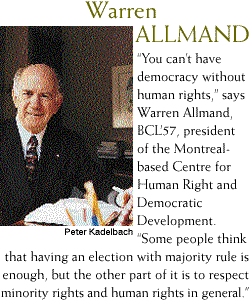 Allmand was appointed by Prime Minister Chrétien to the Centre in February 1997, after retiring from a 31-year career as Liberal Member of Parliament for the Montreal riding of Notre-Dame-de-Grâce. He began his political career in 1965 and joined the cabinet of Pierre Trudeau in 1972. Allmand was appointed by Prime Minister Chrétien to the Centre in February 1997, after retiring from a 31-year career as Liberal Member of Parliament for the Montreal riding of Notre-Dame-de-Grâce. He began his political career in 1965 and joined the cabinet of Pierre Trudeau in 1972.
In his successive appointments as Solicitor General, Minister of Indian Affairs and Northern Development and Minister of Consumer and Corporate Affairs, Allmand implemented measures to strengthen gun control, established an ombudsman for the correctional system and brought women into the Royal Canadian Mounted Police.
But his proudest moment, he says, was his role in abolishing capital punishment in Canada in 1976. A five-year partial ban that made the death penalty applicable only in cases of police or prison guard murders had been in place for three years. It was the second consecutive five-year ban since 1968.
"I tried to get a total ban in 1973 (when the first partial ban ended) but I couldn't, because it didn't have enough support, even in my own party," he recalls. So a further partial ban was introduced and Allmand found himself going to cabinet for approval to have each death sentence commuted to life in prison.
As Solicitor General, he introduced the bill to abolish the death penalty and saw it passed in the House of Commons on July 14, 1976. "Bastille Day," he says, chuckling at the symbolism. "That's when the debate just happened to end."
After lobbying efforts among MPs from different parties, church groups, authors (including Pierre Berton and Margaret Atwood) and the public, six MPs helped tip the free vote in favour of abolition.
Allmand says changing political winds spurred him to resign from Parliament in February 1997. "In the years under Trudeau we were building things: medicare, multiculturalism, unemployment insurance," he says. "In recent years, the thrust of government has been to cut things back."
Becoming president of the International Centre for Human Rights and Democratic Development has allowed Allmand to continue his human rights work. The nonprofit, nonpartisan centre was established in 1988 by an Act of Parliament and officially inaugurated in 1990.
Allmand directs a staff of 26 in the Centre's daily activities. Principally funded by the federal government, it works with citizens' groups, international organizations and governments in 13 countries to promote and defend human rights and encourage the development of democratic societies. It also gives funding to some groups, such as Pakistan's nongovernmental human rights commission.
Despite problems in Latin America, human rights and democracy are improving there, Allmand observes. "Ten years ago there were more dictatorships than democracies. Now there are more democracies than dictators," he says.
Meanwhile, the situation has become grimmer in Asia and Africa, particularly in places where religious fundamentalists are taking over. "One of the earmarks of fundamentalism is its intolerance towards others," he says. Examples Allmand cites are the government of Pakistan's declaration that religious courts will interpret the country's constitution, and the recently imposed ban in Afghanistan on women's right to work and attend school.
Seeing the erosion of human rights that have been fought for and won can be discouraging. But the face of optimism can be seen in a middle-aged Pakistani woman, Shahnaz Bukhari, whose Progressive Women's Association operates out of her house, educating Muslim women about their rights, sensitizing judges to women's issues and raising money for lawyers to defend women in court. Allmand visited her in August, and the International Centre for Human Rights and Democratic Development is providing her with funding.
"She's a very courageous woman, because some of the people in Pakistan think she's interfering with the customs and practices of the country," Allmand says.
 Biochemist Shree Mulay, MSc'66, PhD'69, director of the McGill Centre for Research and Teaching on Women since 1996, is also associate professor in McGill's Department of Experimental Medicine, assistant director of the Royal Victoria Hospital's Endocrinology and Clinical Biology Laboratories and associate fellow of the Centre for Developing Area Studies. Biochemist Shree Mulay, MSc'66, PhD'69, director of the McGill Centre for Research and Teaching on Women since 1996, is also associate professor in McGill's Department of Experimental Medicine, assistant director of the Royal Victoria Hospital's Endocrinology and Clinical Biology Laboratories and associate fellow of the Centre for Developing Area Studies.
Mulay's strong commitment to feminism has led to her writing and speaking about reproductive health issues, such as the testing of anti-fertility vaccines on women, making scientific information about health issues more accessible to women, and making them aware that informed consent in medical procedures and tests is a basic right.
Her work has brought her many distinguished appointments and awards. In 1994, Mulay served as a government advisor on the Canadian delegation at the United Nations International Conference on Population and Development in Cairo. In 1997, the Fédération des femmes du Québec awarded her the Prix Idola Saint-Jean for distinguished service to women's causes and the YWCA presented her with a Woman of Distinction Award this year.
Accolades aside, the work Mulay has found most meaningful has been establishing the South Asian Women's Community Centre in Montreal. "It means women who have been physically and mentally abused can go to heal themselves and get away from what has been happening to them," she says. Mulay, who came to Canada from India in 1965, helped start the Centre in 1981 to assist immigrant women who frequently experience feelings of isolation.
"In Quebec, not only are they faced with a new environment, but they also have to confront a whole new language, which leads to an inability to go out and seek the necessary help," she explains.
While the Centre's informal surveys initially revealed that the women wanted to have English and French classes, the need for information and referral services began to increase as more and more refugees started arriving from South Asia. Operating five days a week, the staff also became increasingly aware of spousal abuse within the community, as more and more women began stepping forward to say that they were being battered. Today, the Centre serves about 3,000 of the Montreal South Asian community's 30,000 members.
For the past two years, Mulay has been visiting South Asia twice a year. Her interest in bettering the lives of women has led her to work on a health project in Bangladesh.
While Western nongovernmental organizations have been promoting the use and distribution of contraceptives, Mulay has found that improved family health care -- and not lower birthrates -- is the answer to cutting the mortality rates among women and children. Although she finds the human rights situation depressing, Mulay says seeing women in third world countries beginning to organize is one of the bright spots.
"Bad things continue to happen to women because of fundamentalism (both Hindu and Muslim), but it brings out the fighting spirit in women," she says. "They are getting organized and working in collectives much more than before."
Watching younger women become involved in the feminist movement is also a sign of positive change. "They have acquired the self-assurance to see themselves as equals and so demand to be treated as equals," Mulay observes.
A "wonderful support system," made up of her colleagues and fellow women's rights advocates, and her work at the Royal Victoria Hospital help Mulay keep up the battle for women's rights. "My lab is a wonderful retreat," she says. "When I spend time doing experiments at the bench I'm able to focus on something very small and in my control, so it's relaxing."
Gardening also provides a welcome respite. "I spend my weekends digging up weeds and when I'm mad I dig up more weeds," she chuckles. It all helps to keep up that fighting spirit which she says lives in each of us.
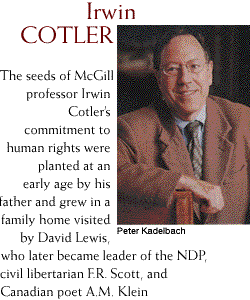 Scott, who taught constitutional law to both Cotler and his father, "symbolized someone who had been in the trenches and was a model of what human rights law is about," Cotler recalls. Scott, who taught constitutional law to both Cotler and his father, "symbolized someone who had been in the trenches and was a model of what human rights law is about," Cotler recalls.
Now it is Cotler, BA'61, BCL'64, who is a model to others. A law professor at McGill since 1973, he has blazed his own trail as an international human rights lawyer. He has acted as legal counsel to political prisoners like Nelson Mandela, Andrei Sakharov and Natan Sharansky. He has testified as an expert witness on human rights before government committees in Canada, the United States, Russia, Sweden, Norway and Israel, and he is chair of InterAmicus, the McGill-based International Human Rights Advocacy Centre.
In the 1980s, Cotler was very active in the anti-apartheid movement, rallying international support for the imprisoned Mandela, who was not yet the symbol of apartheid injustice and figure of adulation that he later became (even Amnesty International did not yet recognize him as a political prisoner, claiming he advocated violence). On Cotler's first visit to South Africa in 1981, he gave a talk at the University of Witwatersrand titled "If Sharansky why not Mandela?" in which he called for an international campaign for Mandela's release, and was promptly arrested by South African police for daring to speak of the man who would become an international hero. Cotler was later a key figure in mobilizing universities around the world into divestment campaigns (the "mobilization of shame"), providing support to the anti-apartheid movement within South Africa itself, and developing a new constitution for a post-apartheid society.
Born in 1940, Cotler grew up in the shadow of the Holocaust, which taught him his first human rights lesson. "The Holocaust didn't begin in the gas chamber," he says. "It started with words." Nazism almost succeeded, he says, because of the ideology of hate, the teaching of contempt and the demonizing of the "other." The recent massacres in Bosnia and Rwanda show that it's a lesson that the world is still learning.
Despite the proliferation of international human rights treaties and covenants, the commitment to human rights is ebbing -- if not being abandoned completely, Cotler says. Glasnost in Russia brought freedom for hundreds of millions of people, but it also unleashed xenophobia and racism, he points out. Many of the 190 countries that have ratified the International Convention on Children's Rights are themselves violators, as children die of hunger, are injured by war or work in slavery or prostitution.
Nevertheless, he cautions against cynicism. "To be cynical is to remain indifferent," he says. "Nazism almost succeeded partly because of indifference, because of a conspiracy of silence."
Cotler's work for human rights is "a privilege rather than an obligation. Being involved with people who put their lives on the line has provided me with energy, inspiration and commitment to stay the course."
It's a path he hopes his three children, aged 11 to 19 and whom he describes as "a humbling presence in his life," will join him on eventually.
|